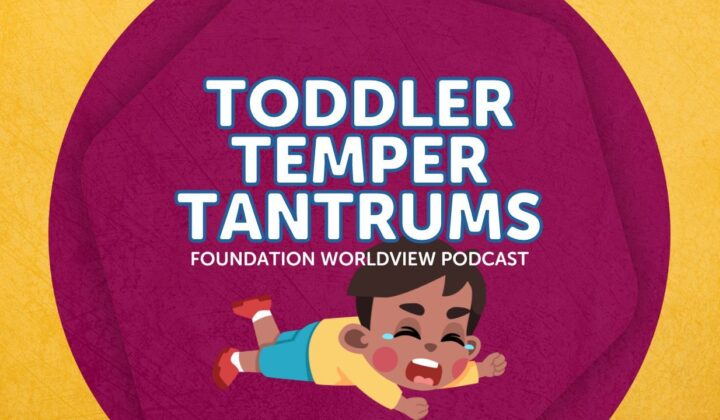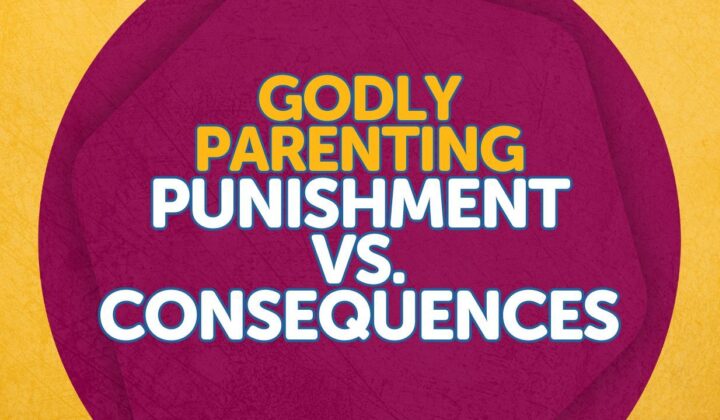Learn more about the journey that led to us equipping kids to carefully evaluate every idea they encounter.
Meet members of our team who have contributed to curriculum development.
Hear from real users of the Foundation Curriculum.
Learn what we believe about God, Jesus, Scripture, and more.
How to Biblically Discipline Whining in Young Children
Hello friends! Today's podcast question says, "How do I biblically discipline whining? My 4-year-old has taken up a bad habit of whining and I have no idea how to biblically approach training him to stop."
This is a really important question for anyone who is working with children to think through. In those younger years—probably between the ages of two and seven—whining tends to be a really big issue. But it's also linked to what we would consider complaining or grumbling that is prevalent in children eight and up. It's really important for us to think through: How do we biblically handle this? How do we help our kids think biblically about it? And then how do we train them in a biblical way?
That's the question we're going to dive down deep into today on the Foundation Worldview Podcast, where we seek to answer your questions so that you can equip the children that God has placed in your care to carefully evaluate every idea they encounter and understand the truth of the biblical worldview.
A Quick Request
Before we dive down deep into looking at the concept of whining and how we address it biblically, if you have been helped by the Foundation Worldview Podcast in the past, would you do me a favor? Would you invest the few seconds that it takes to rate and review this content on a podcast app? As the internet continues to change and the algorithms continue to change, it's becoming more and more difficult to make sure that our content appears in the feed of those who have subscribed, as well as to make sure that others are able to discover it who are in search of this kind of content. The more reviews that we have on different podcast platforms, the easier it becomes for our content to appear both in the feeds of those who have already subscribed and for those who are searching for this kind of content to be able to find it.
Thank you so much in advance for helping us out with that.
Understanding the Sin of Whining
Before we can address whining or complaining or grumbling in our children, we need to understand what the sin of whining is. Whining is the sin of coveting. It's wanting what we don't have and complaining about it.
You may never have thought of whining in this sense before. You may have just thought, "Oh, whining is something super annoying that my child does." But it's more than that. It's actually a sin. It's coveting. It's wanting what we don't have and complaining about it. And it is a sin, and therefore it's serious. That means that this isn't something we can just push to the wayside. It's something that we need to directly address with our children because Scripture is clear that this covetous heart that is not grateful for what it has been given actually leads to a further darkening of our hearts.
Romans chapter one, verses 21 and 22 says: "For although they knew God, they did not honor him as God or give thanks to him, but they became futile in their thinking and their foolish hearts were darkened. Claiming to be wise, they became fools."
We see this on a very large scale in our culture today—so many people are complaining about what they don't have and what they think they deserve. It's easy for us as believers to watch people just really spiral out of control as they think that they deserve more and more and more and complain about it more and more and more. Their hearts are just becoming darkened and their minds are becoming foolish, and we do not want this for our children.
How to Address Whining Biblically
So how do we address whining? How do we address this sin of coveting in our children?
First, we need to pray for our children's hearts. We need to pray that God would awaken them to the truth of the gospel. We need to pray that they would turn from their sin and they would trust in Jesus, because that is our children's primary issue—they are not reconciled in their relationship to God. We need to pray that God would awaken them to their sin and that they would turn from that sin and trust in Jesus.
Second, we need to train them in the antidote of grumbling or whining or complaining, which is gratitude. We need to train them in gratitude.
If you've never read the book Don't Make Me Count to Three by Ginger Hubbard, I highly recommend that you check out that book. It's one of my favorite parenting books. In that book, Ginger explains that if we punish our children for sinning but we don't then take the second step of training them to live rightly—of training them to live righteously—we are disobeying the command in Ephesians six, which says, "Fathers, do not provoke your children to anger, but bring them up in the discipline and instruction of the Lord."
If we punish them for wrong behavior and don't teach them right behavior, we are actually provoking them to anger. So rather than just every time they whine, punishing them for it—which, yes, punishment is needed, and we'll get to that in a little bit—we need to make sure that we are actively training them to have hearts that are grateful.
Practical Ways to Train in Gratitude
I recommend at breakfast each morning, just go around the breakfast table and list two or three things that you were thankful for. Or if that seems like too many right off the bat, just have everybody list one thing that they are thankful for. This will just get you in the habit of starting to think: What do I have? What have I been given that I'm really grateful for?
Another thing to do is to write thank you notes or draw thank you pictures for people who have done things for you or have given you things. Anytime your child receives a gift, make sure that they are writing a thank you note for that gift or they're coloring in a thank you picture if they're too young for that. This is something I know my mom did with us when we were growing up, and I really didn't like it. But I'm so grateful that she made us do it—that every time we got a birthday present or a Christmas present, she made us write a thank you card. This is something that in the moment I did not like as a child, but it really trained me in the art of gratitude. And so now it's just natural for me to write thank you notes.
Also, I highly recommend that you memorize First Thessalonians five, verses 16 through 18, with your children. This passage reads: "Rejoice always, pray without ceasing, give thanks in all circumstances, for this is the will of God in Christ Jesus for you."
This is an important one because it tells us exactly what God's will is. Don't you love passages of Scripture like this? Because so many people are out there praying like, "Lord, show me your will." And there are times where we need to pray for direction. However, there are also passages of Scripture where God directly tells us what his will is. So what is His will according to this passage? That we rejoice always, we pray without ceasing, and we give thanks in all circumstances.
Memorize this passage of Scripture with your children and then be intentional at practicing gratitude, because that is the antidote for whining. It's the antidote for grumbling. It's the antidote for murmuring. It's the antidote for complaining—gratitude.
Consistent Discipline
Now, once you start practicing gratitude, are your children going to magically stop whining? No, because your children wrestle with sin just like you and I do.
I think the next step is to be consistent in disciplining your child when they whine. Sometimes what this discipline involves is it just involves correcting them in the moment.
Example One: The Waffle Situation
For example, let's say one morning your family's having waffles for breakfast and your child is like, "Waffles? I don't want waffles. I can't stand waffles!"
What you can do is you can say, "Okay, I need you to pause. That is whining. We've already talked about how whining is a sin. It's coveting. It's complaining about something that we don't have. Let's think: How could you tell me that you're not a fan of waffles in a way that isn't whining?"
And then walk them through it. You can say, "You could say, 'Mama, can I have something else for breakfast?'" Walk them through how to say it without their head on their hands, without their shoulders slouched: "Mama, can I have something else for breakfast?"
Have them practice saying this. This is something, especially when children are seven and younger, that is so important for us to have them practice saying things in the way that they should, because many times they just don't know how to do this.
Now, chances are that even if your child tells you in a nice way that they don't want waffles for breakfast, there's not going to be another option for breakfast that morning. It's good to train our children to be grateful for what they have, even if they're not fond of it. So then you can respond to them by saying, "You know what? This morning we are going to have waffles. I know that waffles are not your favorite, but you know what the good news is? Tomorrow we're going to have something else."
And then walk them through: How can you respond with a grateful heart even though you're disappointed?
Is your child going to respond to all of this perfectly? No. They might still have a bad attitude. And if that happens, you can say, "You know what? I love you too much to let you keep having this bad attitude. So I need you to have a grateful heart and to demonstrate a grateful heart, or you're going to need to [whatever that is, whether it's a timeout or some other kind of punishment]."
Example Two: Leaving the Park
Thinking through another similar example: Let's say you're at the park and you've told your child, "We have three minutes left, and then we have to go." And then you're like, "Okay, the three minutes are done. Come on over." And they're like, "I'm not ready to leave yet. I don't want to leave the park yet."
This is again where you can go over and you can say, "Okay, we've already talked about how whining is a sin against God. It's having a grumbling heart, not a grateful heart. How could you let me know that you're feeling disappointed without whining?"
Because we don't want to train our children to falsely believe that they have to be happy about everything, because that is not at all what Scripture leads us to believe. We are not called to be happy about everything. We can be disappointed, we can be sad, but we are not to be grumbling and complaining.
So ask your child, "How could you let me know that you're disappointed without whining?" Your child might have no idea. So then give them an example. Say, "You could say, 'Mama, I'm feeling sad that we are leaving.'"
And then have your child say that: "Mama, I am feeling sad that we are leaving." Give them an alternative. And then you can respond by saying something like, "I know you're feeling sad that we are leaving, but wasn't it so nice that we got to spend time at the park today? On our walk home or on our drive home, let's spend some time thanking Jesus that we were able to have fun at the park today."
In these moments, I'm hoping you're seeing that the goal is to address the issue, help illuminate what sin it is—that it's the sin against God, it's coveting, it's wanting what we don't have and then complaining about it—and then giving them a different alternative. Walking them through: How could they say that in a way? How could they express their feelings in a way that's not whining and complaining? So you're acknowledging their feelings and then walking them through gratitude.
When Whining Continues
Now, if your child continues to whine, you can affirm their feelings by saying, "You know what? I know that you're feeling disappointed. You really don't like waffles," or "I know that you're feeling sad because we're leaving the park." Remind them though that whining is a sin and that you love them too much to let them stay stuck in their sin, so they're going to need to be disciplined when you get home.
Depending on the situation and their reaction and the severity, you may need to use different forms of discipline. For mild infractions, it might be just losing a small privilege or a timeout or whatever forms of discipline you use. For more serious infractions, when they have a meltdown, when they have a defiant attitude—in those situations, it's usually wisest and biblical to implement a physical form of discipline: to spank them out of love with a calm spirit, not out of anger, but to spank them so that they have a physical reminder that what they are doing is wrong, that it's sin, and that you love them too much to let them stay stuck in their sin.
Again, I highly recommend you check out that book, Don't Make Me Count to Three by Ginger Hubbard. I think about the entire last third of the book is all on spanking and how to biblically implement the rod in a way where it's not done out of anger, it's done out of love, it's keeping your relationship with the child, and it's being faithful to the biblical command that we are given to use the rod with our children.
A Final Important Thing
Just this one final thing as we're thinking through biblically addressing whining in our children: I think it's also really important that as we're doing this, we pray that God would convict us quickly when we fall into the sin of whining or grumbling. Let's be honest—there are so many times, probably multiple times throughout a day, when we are tempted to whine, to complain, to gripe, to grumble, when we are not having a heart of gratitude before the Lord.
I think it's really important that we pray that God would convict us quickly and that he would grow us each and every day in the grace of gratitude. And then when we blow it, when we complain about something, when we whine about something, this is an opportunity for us to model repentance before our children—for them to see that mom doesn't have it down perfectly, dad doesn't have it down perfectly, but because of God's grace, we can repent of our sin, and he offers us forgiveness through the life, death, and resurrection of Jesus.
Conclusion
Well, that's a wrap for this episode! Training our children to respond with gratitude instead of whining is one of the most important heart issues we can address in their early years. The strategies we've discussed today—prayer, active gratitude training, consistent discipline, and modeling repentance—will help you equip your child to develop a heart that honors God.
Ready to go deeper in equipping the children in your life with a biblical worldview? Join our email list to receive practical resources, biblical parenting insights, and updates on new episodes you won't want to miss. We're committed to helping you faithfully guide the next generation, and we'd love to partner with you in this crucial work. Or, if you're looking for a comprehensive curriculum to help your children carefully evaluate every idea they encounter, check out Foundation Worldview's age-appropriate resources designed to build a strong biblical foundation.
If you have a question that you would like for me to answer on a future Foundation Worldview podcast, you can submit that by going to FoundationWorldview.com/podcast.
As we leave our time together, my prayer is that no matter the situation in which you and the children that God has placed in your care find yourselves, you would trust that God is working all things together for your good by using all things together to conform you more into the image of His Son.
Related Posts and insights

Is Spanking Biblical? What the Bible Really Says About Physical Discipline
Discover a biblical perspective on spanking as a form of discipline. Explore Scripture's wisdom, balance love and correction, and avoid hypocrisy.

How to Deal with Toddler Tantrums
"How should I deal with my toddler's temper?" This episode dives into effective strategies like setting clear expectations, consistency in discipline, and developmentally suitable consequences.

Punishment vs Natural Consequences: Applying Biblical Wisdom to Parenting
Should Christian parents punish their kids or rely on natural consequences? Explore biblical discipline and how to train children in love and wisdom.



